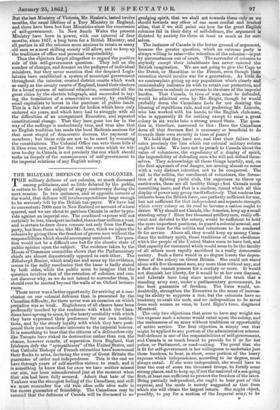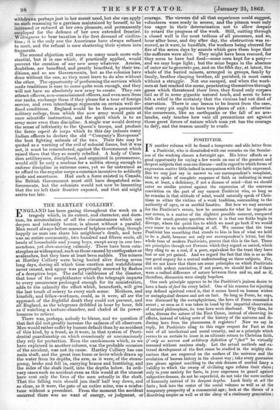THE MILITARY DEFENCE OF OlTR COLONIES.
THE military defence of our colonies, so much discussed among politicians, and so little debated by the public, is certain to be the subject of angry controversy during the next session. In two instances, and at opposite corners of the world, that defence will involve expenditure large enough to be seriously felt by the British tax-payer. We have had to concentrate 7000 men in New Zealand on account of a local quarrel, and we are about to garrison Canada in order to pro- vide against an imperial one. The combined expense will not certainly be less, transport included, thane clear million a year, and is certain to draw down censure not only from the Peace party, but from those who, like Mr. Lowe, think we injure the colonies by giving them the freedom of grown men without the responsibilities which should accompany manhood. The ques- tion would not be a difficult one but for the chaotic state of public opinion upon the subject. The evidence taken by the House of Commons committee shows that the Parliamentary chiefs are almost diametrically opposed to each other. The _Edinburgh Review, which analyzes and sums up the evidence, comes to the sulky conclusion that the issue is badly stated by both sides, while the public seem to imagine that the question involves that of the retention of colonies, and can- not discover why, as we do not intend to surrender them, it should ever be mooted beyond the walls of an Oxford lecture- room.
There never was abetter opportunity for arriving at a con- clusion on our colonial defences than is presented by the Canadian difficulty, for there never was an occasion on which prejudice was so weak. Englishmen of all classes have been profoundly touched by the readiness with which the Cana- (Hans have sprung to arms, by the hearty cordiality with which they have expressed their preference for our own institu- tions, and by the steady loyalty with which they have post- poned their own immediate interests to the imperial honour. It is something to hear that the citizens of a defenceless city like Toronto have risked its destruction rather than run the chance, however remote, of separation from England, that Irishmen defy the "sympathizers" of the United States, and that Catholic Bishops of French extraction have summoned their flocks to arms, declaring the sway of Great Britain the guarantee of order and independence. This is the end we have through years of self-sacrifice striven to reach, and it is something to know that for once we have neither missed our aim, nor been misunderstood just at the moment when that aim had been fully secured. Admit that hate of the Yankees was the strongest feeling of the Canadians, and still we must remember the old rule idem relic idem nolle is the surest guarantee of friendship. The Canadians may be assured that the defences of Canada will be discussed in no grudging spirit, that we shall act towards them only as we should towards any other of our most cordial and, trusted allies, that if we still point out how far the great English colonies fail in their duty of self-defence, the argument is dictated by anxiety for them at least as much as for our- selves.
The instance of Canada is the better ground of argument, because the greater question, which an extreme party is always willing to raise—the retention of the colonies—is put by circumstances out of court. The surrender of colonies to anybody except their inhabitants has never entered the British imagination. We are not going to give the Cape to the Dutch, or Mauritius to the French, even though their retention should involve war for a generation. As little do we contemplate giving up any population which clearly and unmistakably indicates its wish to retain our protection, and its readiness to submit in extremis to its share of the imperial burden. That Canada, in time of war, must be defended, would be admitted even by Mr. Bright, though he would probably deem the Canadians fools for not desiring the blessing of republican rule, and not preferring Mr. Lincoln, who has worked with his hands, to the English club-man, who is apparently fit for nothing except to raise a great colony in six weeks into a strong armed State. The ques- tion is, therefore, narrowed to this : Have the Canadians done all that freemen find it necessary or beneficial to do towards their own security in time of peace ? We hold that they have not, and that their failure indi- cates precisely the line which our colonial military reform ought to take. We have not to preach to Canada about the value of volunteers, the expediency of a display of spirit, the impossibility of defending men who will not defend them- selves. They acknowledge all these things heartily, and, on the first approach of real danger, are arming almost en mane with a very distinct intention not to be conquered. The call to the militia, the enrolment of volunteers, the forma- tion of a fighting yacht club, the eagerness to throw up earthworks, these are all healthy things ; but Canada needs something more, and that is a nucleus, round which all this display of power may group itself effectively. That nucleus has hitherto been the British force, one perfectly sufficient for war, but not sufficient for that independent and separate strength which every colony on its road to become a nation ought to desire. Why should not Canada, like America, keep up a small standing army ? Even five thousand artillerymen, really effi- cient and devoted to the colony, would be sufficient to hold the more important positions, to guard a colonial arsenal, and to allow time for the militia and volunteers to be rendered fit for service. Above all, they would keep up among Cana- dians the military spirit, those traditions of exact obedience which the people of the -United States seem to have lost, and that capacity for command whieh would seem to be the faculty of all others most rapidly sacrificed in a really democratic society. Such a force would in no degree lessen the depen- dence of the colony on Great Britain. She could not stand alone with five thousand men, any more than without any, and a fleet she cannot possess for a century or more. It would not diminish her liberty, for it would be at her own disposal, and Liberals have long since accepted the truth that a standing army may, under a parliamentary government, be the beat guarantee of freedom. The force would, un- doubtedly, strengthen the Executive in the sense of increas- ing its ability to suppress a riot, but the colonists have no tendency to exalt the mob, and no indisposition to be saved from such scenes as once, in Lord Elgin's time, disgraced Montreal.
The only two objections that seem to have any weight are the expense such a scheme would entail upon the colony, and the uselessness of an army without traditions or opportunity of active service. The first objection is simply one that might be applied to any portion of the administrative scheme. Self-defence is one of the responsibilities of self-government, and Canada is as much bound to provide for it as for her police, or Parliament, or road-making. The proof that she is fit for self-government is her willingness to undertake just these burdens, to bear, in short, some portion of the heavy expense which independence, according to its degree, must always entail. If she were independent, she would have to bear the cost of some ten thousand troops, to fortify some strong places, and to keep up, if not the materiel of a sea-going fleet, at least one sufficient to protect the freedom of the lakes. Being partially independent, she cught to bear part of this expense, and the mode is merely suggested as that from which she will obtain the largest return. She might object, possibly, to pay for a section of the Imperial army, to be withdrawn perhaps just in her sorest need, but she can apply no such reasoning to a garrison maintained by herself, to be increased or reduced at her own pleasure, and permanently employed for the defence of her own extended frontier. Willingness to bear taxation is the first demand of civiliza- tion; it is the only one the Americans have always refused to meet, and the refusal is now shattering their system into fragments. The second objection will seem to many much more sub- stantial, but it is one which, if practically applied, would prevent the creation of any new army whatever. Armies, doubtless, are benefited, and greatly, benefited, by their tra- ditions, and so are Governments, but as the colonies have done without the one, so they must learn to do also without the other. The opportunity of performing the services which make traditions is sure to come quite soon enough, and they will not have an absolutely new army to create. They can attract officers, non-commissioned officers, and even men from our ranks, exchange them if they please for a tour of foreign service, and even interchange regiments on certain well de- fined conditions. England would be to them a permanent military college, from which the new army would gain at once scientific instruction, and the spirit which is to an army more even than discipline. A single war would destroy the sense of inferiority to the Queen's troops, and produce the fierce esprit de corps which to this day induces many Indian officers to declare the old "Company's Europeans" the best fighting animals of the two. Their fate may be quoted as a warning of the evil of colonial forces, but it was not, it must be remembered, against the Government which raised them that they so nearly rebelled. A body of Cana- dian artillerymen, disciplined, and organized in permanence, would still be only a nucleus for a militia strong enough to enforce discipline in extreme cases, yet so far untrained as to afford to the regular corps a constant incentive to soldierly pride and smartness. Had such a force existed in Canada, the British Government must still have despatched rein- forcements, but the colonists would not now be lamenting that the ice left their frontier exposed, and that aid might arrive too late.































 Previous page
Previous page